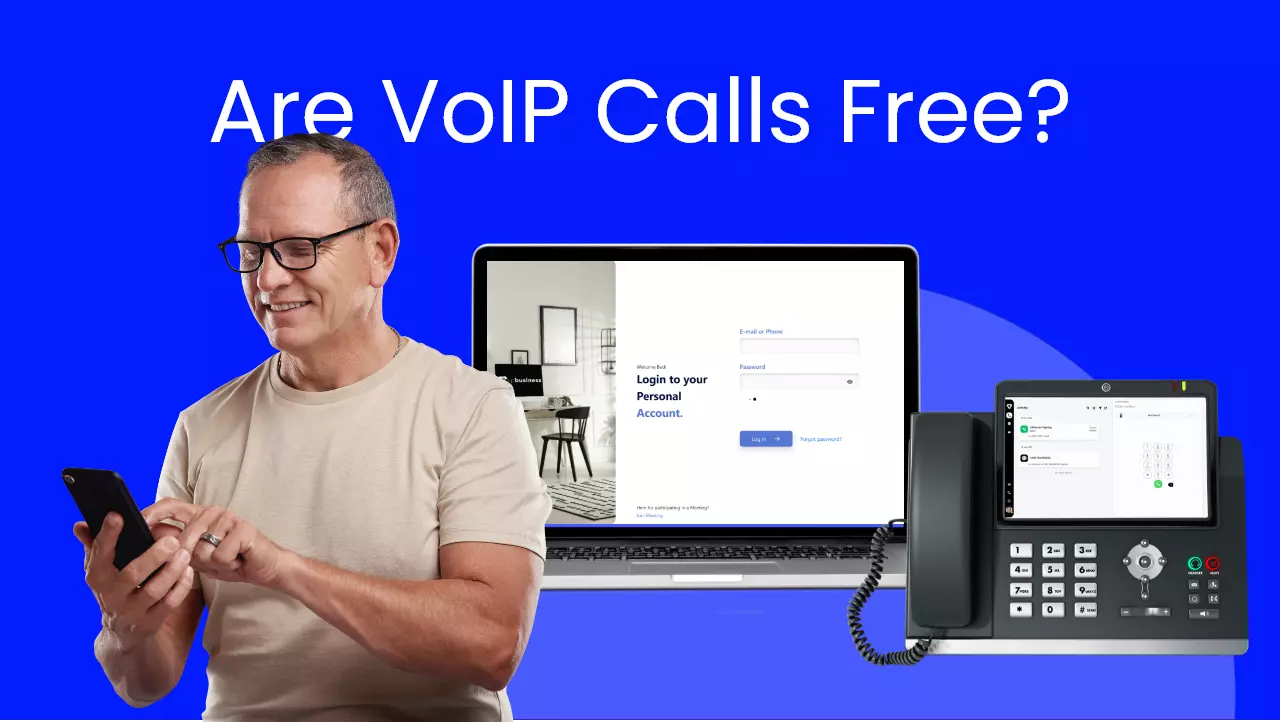One of the significant reasons for shifting to VoIP from traditional landlines is cost-effectiveness. It is true for individuals and business users, although businesses will save much more money than residential VoIP users. The cost reduction is due to low call charges, no need to purchase expensive hardware, less maintenance, no service fees or hidden charges, and no monthly contracts.
But before shifting to VoIP, many people have a question: are VoIP calls free?
In recent years, VoIP has become a cost-effective alternative to traditional phone systems. In recent years, Voice over Internet Protocol (VoIP) has gained popularity as a cost-effective alternative to traditional phone systems.
Many people are attracted to making phone calls over the Internet, wondering if VoIP calls are truly free.
In this article, we will explore the dynamics of VoIP calls and shed light on whether they are entirely free. First, let’s understand what VoIP is.
What Is VoIP?
VoIP, which stands for Voice over Internet Protocol, is a technology that enables you to make phone calls over the Internet. It is also known as Voice over Networks (VoN), Voice over Broadband (VoB), or Internet Telephony. The beauty of VoIP is that it allows you to make free or incredibly low-cost phone calls worldwide, regardless of the equipment or network the person you are calling uses.
One of the significant advantages of VoIP is that it leverages digital and internet technologies, such as Session Initiation Protocol (SIP). It opens up a whole new world of features and services that were previously expensive or even impossible with traditional telephone systems. With VoIP, you can enjoy advanced features like call forwarding, voicemail-to-email transcription, virtual phone numbers, video calling, and more.
By utilizing the power of the Internet, VoIP eliminates the need for dedicated telephone lines and allows for greater flexibility. You can call using various devices, including computers, smartphones, or specialized VoIP phones. This convenience means you can take your phone number and make or receive calls from anywhere with an internet connection.
VoIP also excels in making international calls more affordable. Traditional phone services often charge hefty rates for international calls, but VoIP offers significantly lower costs for calling overseas. This cost-effectiveness has made VoIP popular for businesses and individuals with international connections.
How Do VoIP Calls Work?

Traditional phone calls rely on dedicated copper lines, which can only handle phone traffic. Phone operators and carriers have to invest in building infrastructure to connect each house, and they charge customers based on tariffs to cover these expenses.
VoIP, on the other hand, utilizes existing data networks, primarily the Internet. Users already pay for their Internet connection to their Internet Service Provider (ISP). VoIP providers do not need to build separate connections for each customer since they leverage the existing Internet infrastructure. That is why many VoIP calls, especially domestic ones, can be offered for free. VoIP providers do not have to bear termination charges if the entire call stays within the Internet, and they do not need to recover infrastructure investments.
However, suppose any part of a VoIP call connects to the Public Switched Telephone Network (PSTN). In that case, the vendor might have to pay termination charges to other entities in the telecom network. Therefore, some VoIP calls may incur charges, typically lower than traditional PSTN rates.
Are There Any Free VoIP Calls?
In some cases, VoIP calls can indeed be free. Many service providers offer free calling between users on the same VoIP network. For instance, if you and your friend use the same VoIP service or software, you can make unlimited calls without incurring charges.
Furthermore, some VoIP providers offer free calls to specific destinations, such as landlines or mobile numbers, in certain countries. These free calling options are usually limited to selected regions and are subject to certain terms and conditions.
Factors That Influence the Cost Of VoIP Calls
While free options are available, it is important to note that not all VoIP calls are entirely free. Several factors can influence the cost of VoIP calls:
i. Call Rates
VoIP providers often charge for calls made outside their network or to non-VoIP numbers. These charges vary depending on the provider and the destination of the call. Reviewing the pricing structure and any associated fees before making calls outside the provider’s network is essential.
ii. Subscription Plans
Some VoIP services offer subscription plans that provide a certain number of minutes for a fixed monthly fee. Additional charges may apply if you exceed the allotted minutes or call non-included destinations.
iii. International Calls
Making international calls through VoIP can be significantly cheaper than traditional phone services. However, international rates can still apply, depending on the provider and the destination country.
iv. Internet Connection
VoIP calls require a stable and reliable internet connection. If you have a limited data plan or incur additional charges for internet usage, the cost of your VoIP calls may indirectly impact your overall expenses.
How Are VoIP Calls Charged For Consumers?
The pricing models for VoIP services can vary depending on whether they cater to individual consumers or businesses. Like in other industries, the needs of individuals and households differ from those of organizations. For individual users, the focus is often on simplicity and cost-effectiveness, so call charges play a significant role in their monthly bills.
One common pricing model resembles the way traditional phone carriers charge for landline services. It typically involves a monthly service fee that covers a certain number of minutes included in the plan. Any additional minutes used beyond the allocated limit may incur extra charges. Some VoIP plans also offer unlimited calls, either for domestic calls or long-distance calls to specific countries. These unlimited plans benefit families with relatives living abroad, as they can make calls without worrying about minute-based charges.
In another billing approach, vendors may sell hardware, such as an adapter or VoIP box, to consumers for making VoIP calls. However, the actual calls themselves are free of charge. Consumers pay an upfront amount for the hardware, and all calls from that particular number are included at no additional cost. This model is similar to unlimited calling plans and is suitable for individuals who make frequent calls.
These various pricing strategies provide consumers flexibility and options for choosing the VoIP service that best suits their needs and budget. Whether it is a plan with allocated minutes, unlimited calling, or hardware-based pricing, VoIP services aim to offer cost-effective communication solutions for individual users.
How Are VoIP Calls Charged For Businesses?
Regarding enterprise-grade services, call charges and billing plans can vary to accommodate the unique needs of businesses. There are generally two types of call charges: pay-as-you-go and unlimited plans, similar to what consumers offer. The choice between these options depends on the organization’s specific requirements.
Companies with consistently low call volumes may opt for pay-as-you-go plans, where they are charged based on the usage of their calls. On the other hand, organizations with call centers or anticipate a higher volume of calls may prefer unlimited plans to ensure they can make as many calls as needed without worrying about additional charges.
Billing models for enterprise services can also vary. Some providers charge per seat, meaning the more users or employees a company has, the higher the overall cost. This pricing structure does not consider whether all features are utilized or not. Other providers may offer different tiers of service, where the pricing and features vary across each tier. The basic tier may be free or affordable but may lack some of the more advanced features that businesses may require.
Additional features can be added individually or bundled together. For example, visual voicemail may incur an extra charge, but once added, it becomes available to all users on the network. Providers may also offer feature bundles where multiple related features are offered at a set price. It allows organizations to select the bundle that best suits their needs, providing access to a range of features without individually selecting and paying for each.
Ultimately, enterprise services offer flexibility in pricing and feature options to cater to the specific requirements of businesses. Companies can choose between different call charge models, seat-based or tiered pricing, and add additional features individually or through bundles, ensuring they have the necessary tools for efficient communication.
Conclusion - Cold Calling
VoIP calls can indeed be free in certain scenarios. Many VoIP service providers offer free calling between users on the same network or software. Some providers offer free calls to specific destinations or within selected regions, subject to terms and conditions. However, it is important to note that not all VoIP calls are entirely free, and various factors can influence the cost of calls, such as call rates, subscription plans, international calling, and the quality and cost of the internet connection.
The charging models for VoIP calls differ for consumers and businesses. Individual users often have options for monthly plans with allocated minutes or unlimited calling. At the same time, some providers offer hardware-based pricing where the actual calls are free after purchasing the required equipment.
Call charges and billing plans vary based on business call volume, with options for pay-as-you-go or unlimited plans. Additional features may be added individually or through bundled packages, allowing businesses to tailor their communication services to their needs.




